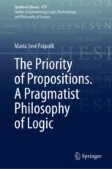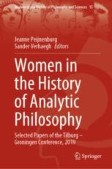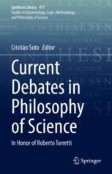Search
Search Results
-
Abstraction without exceptions
Wright claims that “the epistemology of good abstraction principles should be assimilated to that of basic principles of logical inference”. In this...

-
\({\mathcal{C}}\) -Justifications for Atomic Sentences. Names and Predicates, \({\mathcal{C}}\) -Objects and \({\mathcal{C}}\) -Concepts
The aim of this chapter is to define the theoretical notion of \({\mathcal{C}}\)...
-
A Puzzle about Communication
It seems plausible that successfully communicating with our peers requires entertaining the same thoughts as they do. We argue that this view is...
-
Lessons from Inferentialism and Invariantism
In this chapter, I explain what is at issue in the debate on the meaning of the logical constants, exposing some weaknesses of the standard way in...
-
Hale’s argument from transitive counting
A core commitment of Bob Hale and Crispin Wright’s neologicism is their invocation of Frege’s Constraint—roughly, the requirement that the core...
-
Abstraction and Modest Reflection
In “Neo-fregeanism: An Embarrassment of Riches” (Notre Dame J Formal Logic 44(1):13–48, 2003) Alan Weir introduces a number of formal constraints on...
-
Model-Theoretic Semantics for Politically Contested Terminology
This chapter explores the history of model-theoretic semantics, arguing that such theories can provide objective truth conditions for sentences...
-
Parts of Structures
We contribute to the ongoing discussion on mathematical structuralism by focusing on a question that has so far been neglected: when is a structure...
-
Some Remarks on Searle’s View on the Logic of Practical Reasoning
A rational subject who believes that a = b, and also believes that j(a), cannot at the same time disbelieve that j(b), i.e. believe that not-j(b)....
-
Fallacies and Their Place in the Foundations of Science
It has been said that there is no scholarly consensus as to why Aristotle’s logics of proof and refutation would have borne the title Analytics. But...
-
Logicality and the picture theory of language
I argue that there is tension in Wittgenstein’s position on trivialities (i.e. tautologies and contradictions) in the Tractatus, as it contains the...

-
Propositions as Made of Words
I argue that the principal roles standardly envisaged for abstract propositions can be discharged to the sentences themselves (and similarly for the...
-
Compositionality in Context
Compositionality is a principle used in logic, philosophy, mathematics, linguistics, and computer science for assigning meanings to language...
-
Ordinals vs. Cardinals in ℕ and Beyond
Ordinality and cardinality, in the finite domain, are ordinarily considered as mere aspects of the very same objects, the natural numbers. Yet...
-
E. E. Constance Jones on Identity and Predication
E. E. Constance JonesJones, E. E. C. (1848–1922) is best known for her distinction between connotation and denotation, which predates Frege’sFrege,...
-
Constitution Through Noema and Horizon: Husserl’s Theory of Intentionality
Husserlian phenomenology develops around Husserl’s theory of the complex structure of intentionality, featuring key notions of noesis, noema,...
-
The negative theology of absolute infinity: Cantor, mathematics, and humility
Cantor argued that absolute infinity is beyond mathematical comprehension. His arguments imply that the domain of mathematics cannot be grasped by...
-
Truth and Falsity in Communication: Assertion, Denial, and Interpretation
Our linguistic communication is, in part, the exchange of truths. It is an empirical fact that in daily conversation we aim at truths, not...
-
Functionalism as a Species of Reduction
This is the first of four papers prompted by a recent literature about a doctrine dubbed spacetime functionalism. This paper gives our general...
-
Sheldon Smith on Newton’s Derivative: Retrospective Assignation, Externalism and the History of Mathematics
To illustrate the view that a speaker can have a partial understanding of a concept, Burge uses the example of Leibniz’s and Newton’s understanding...

